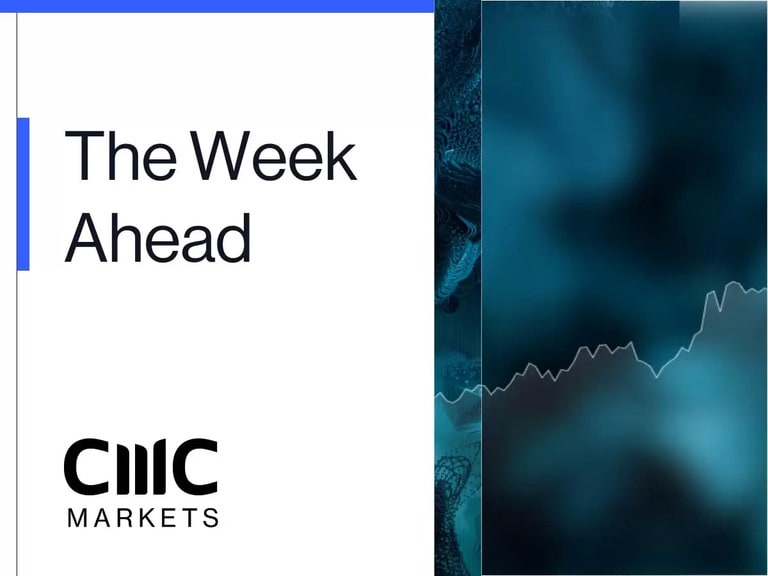
Darren Sinden from educational provider Trade Uni discusses the latest market moves.
On Friday, the S&P 500 closed up by 0.61%, the Dow Jones by 0.97% and the Nasdaq 100 closed up by 0.15%. Stocks settled moderately higher, with the S&P 500 and Dow Jones posting new all-time highs. The strength of bank stocks supported the overall market after JPMorgan Chase and Wells Fargo reported better-than-expected Q3 earnings results.
Friday’s stronger-than-expected US September producer price index (PPI) report bolstered expectations of slower interest rate cuts by the US Federal Reserve and was bearish for stocks. The data showed that the US PPI for final demand eased to 1.8% year-over-year in September from 1.9% in August, stronger than expectations of 1.6%. September PPI excluding food and energy rose 2.8% year-over-year, stronger than expectations of 2.6%. This report coincided with a surge in jobless claims that challenged the US labour market’s resilience to restrictive interest rates.
An 8% plunge in Tesla limited gains in the Nasdaq 100 after Elon Musk unveiled prototypes of the company’s robotaxi Cybercab, which analysts said was “light on details.” Stocks were also pressured after the University of Michigan’s US consumer sentiment index unexpectedly declined 1.2 to 68.9, weaker than expectations of an increase to 71. The University of Michigan’s one-year inflation expectations for the US in October rose to 2.9%, stronger than expectations of no change at 2.7%. October’s five-to-10-year inflation expectations eased to 3% from 3.1% in September, meeting expectations.
Dallas Fed president Lorie K. Logan’s hawkish comments on Friday were negative for stocks. Logan supported a gradual approach to lowering interest rates, saying: "It's really important to look ahead as we chart this path toward neutral, and that we do so in a very gradual way to balance the risks that we have." The results of corporate Q3 earnings may determine the near-term direction of stocks. According to Bloomberg Intelligence, companies in the S&P 500 are expected to report an average 4.7% increase in quarterly earnings in Q3 from a year ago, down from the 7.9% growth projected in July. Markets are discounting the chances at 91% for a 25-basis-point rate cut at November’s Federal Open Market Committee meeting and at 0% for a 50-point cut. Overseas stock markets on Friday settled mixed. The Euro Stoxx 50 rose to a one-and-a-half-week high and closed up by 0.68%. China's Shanghai Composite fell to a one-week low and closed down by 2.55%. Japan's Nikkei 225 climbed to a two-week high and closed up by 0.57%.
The UK and Switzerland will initiate the first round of upgraded free trade negotiations today, focusing on investment and services trade. The British government said on Friday that the current UK-Switzerland trade deal does not include digital trade or data flows as it is largely based on an agreement from 1972 between the European Union and Switzerland, mostly covering trade in goods while both European countries are service-based economies. The enhanced UK-Switzerland free trade agreement will comprise detailed commitments on services and investment for the first time, according to the UK's Department for Business and Trade. The deal could potentially add 120,000 service jobs directly linked to Swiss trade and offer long-term certainty on travel arrangements for UK businesses. The UK is also set to hold an investment summit, looking for inward investment.
Oil prices fell in early European trade on persistent concerns over the demand outlook in top crude importer China. Brent crude is down 1.5% at $77.81 a barrel and WTI trades 1.6% lower at $74.34. China's finance minister laid out spending plans at a news conference on Saturday but didn't elaborate on the size of the stimulus package. Meanwhile, the country's consumer inflation unexpectedly eased in September, while producer price deflation deepened. Fears over sluggish consumption in the world's second-largest economy outweigh concerns over escalating tensions in the Middle East and news that the US expanded sanctions against Iran's petroleum and petrochemical sectors late last week. Markets nevertheless remain on edge waiting for Israel's response against Iran's missile barrage, fearing it might target oil infrastructure.
Gold held around $2,655 per ounce on Monday after gaining 1% in the previous session, as markets continued to assess the Fed’s interest rate outlook following recent inflation reports. In the FX markets the US dollar hovered near recent highs on Monday as investors digested China's somewhat disappointing weekend stimulus announcements, while the euro extended its fall ahead of a central bank meeting this week. The euro was down 0.1% at $1.09285, falling for the 11th time in 12 sessions as investors priced in a widely expected 25-basis-point interest rate cut from the European Central Bank at its meeting on Thursday, with data pointing to deteriorating eurozone activity.






















